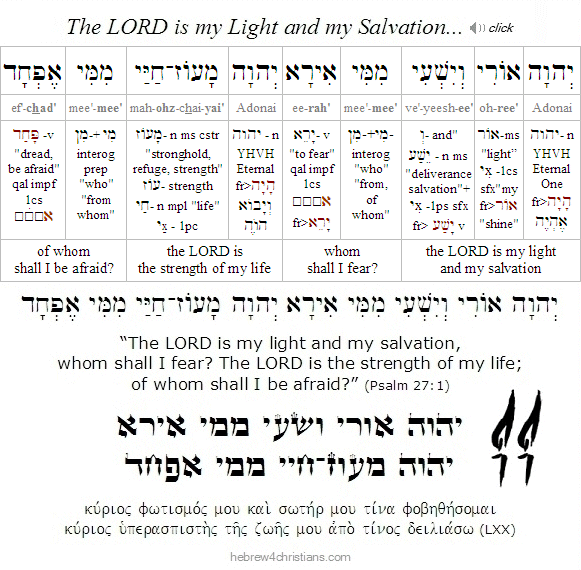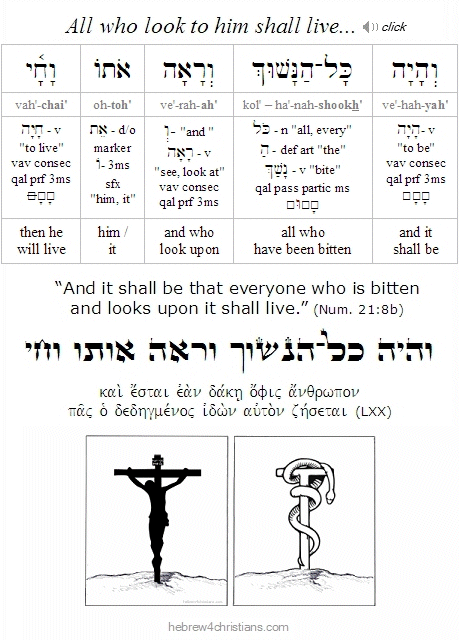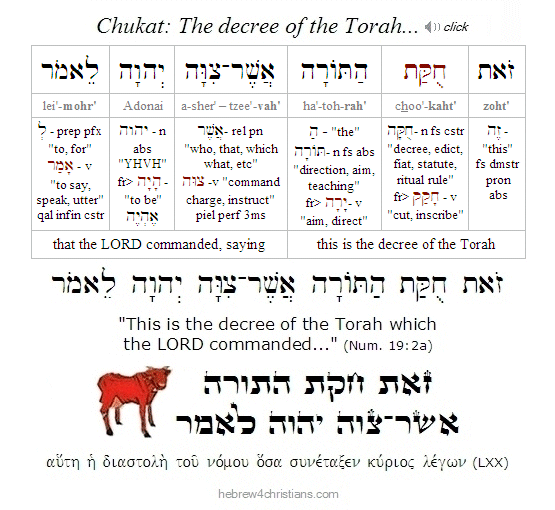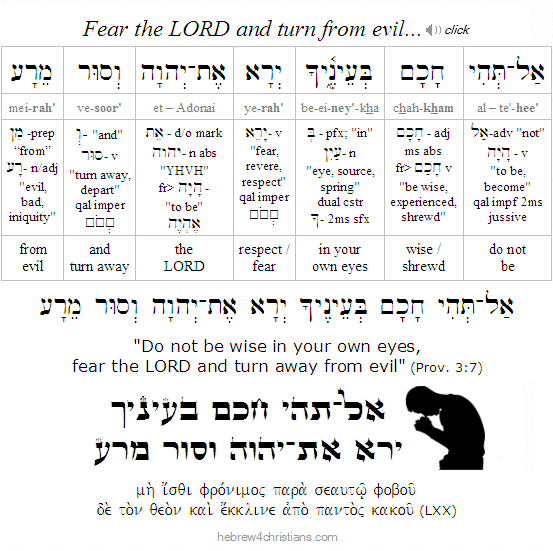|
July 2022 Updates (continued)
Note: If any page content appears to be missing, please refresh the page...
The Foundation of Torah...
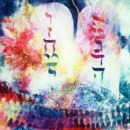
[ The following concerns the foundations of the Torah (yesodei haTorah) and parashat Chukat... ]
07.05.22 (Tammuz 6, 5782) The commandments of God are usually divided between the rational laws (i.e., mishpatim) and the divine decrees (i.e., chukkim), though this distinction is somewhat artificial, since all of the commandments of Torah (and that includes the Torah of the New Covenant) are grounded in the mystery of God's will, which is to say that we are to obey them simply because they derive from the Divine Authority itself... When the people gathered before Moses to receive the covenant at Mount Sinai, they said: "All the LORD has spoken we will do and we will hear" (na'aseh ve'nishmah: נַעֲשֶׂה וְנִשְׁמָע). Note the order: first comes faith in God expressed in the decision to act (na'aseh), and then comes understanding (ve'nishmah). As Yeshua said, "If anyone's will is to do God's will, he will understand" (John 7:17). The heart of faith is willing to do what God asks before hearing (or understanding) what is required. Many people operate the other way round, sitting in judgment of God's word, demanding to understand why they should obey. You cannot understand apart from faith, however, and that is categorically true of all forms of knowledge, which is usually defined as "justified true belief." We are to be "doers of the word and not hearers only, deceiving ourselves" (James 1:22). The Greek verb used in this verse is emphatic: "Be doers!" (γίνεσθε) means "be born!" "Come alive!" "Do, live, and exist before God!" This is a call to creative action, to newness of life...
Hebrew Lesson
Exodus 24:7b reading (click):
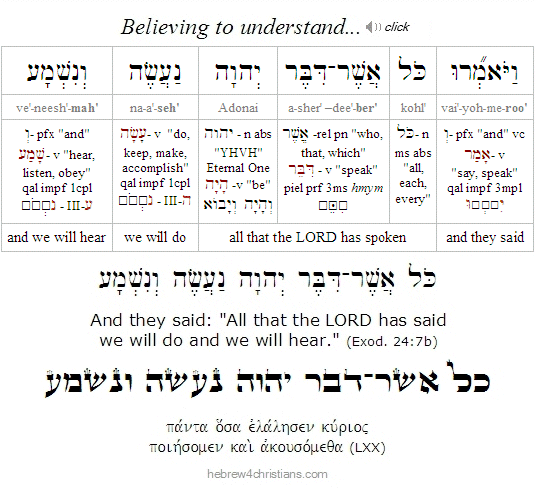 |
The Scriptures state that "if anyone is a hearer of the word and not a doer, he is like a man who looks intently at his natural face in a mirror. For he looks at himself and goes away and at once forgets what he was like" (James 1:23-24). If we just hear the truth but do not act upon it, we are comically likened to someone who looks his face over in a mirror but then promptly forgets what he looks like after he steps away... Likewise those who only hear the word but do not "bring it to life" in their deeds forget who they are and why they were created (Eph. 2:10; Titus 2:14; Col. 1:10). When we look into the mirror of truth we see our need for teshuvah and turn to God for the healing miracle he provides (Heb. 4:12). It's not about doing but being, though being is revealed in doing... If your actions do not align with your values, then back up and recover who you really are in Messiah, understand what your new nature truly is. That is what it means to "take up the yoke" of Messiah, for his yoke is easy (kal) and burden is light, and the task is to repeatedly practice allowing Him to carry your pain, shame, and sin far, far away from your heart.
There is a deeper law, however, a "mirror" that reveals something beyond our passing image. When we look intently into the "perfect law of liberty" (תּוֹרַת הַחֵרוּת וּמַחֲזִיק) - the law of faith, hope, and love for our Savior - we find blessing in our deeds (James 1:25). Note that the verb translated "look into" the law of liberty is the same used when John stooped down to "look inside" the empty tomb of Yeshua (John 20:5). The deeper law reveals the resurrection power of God's invincible love. The Torah of the New Covenant also has many mitzvot, though these are based on the love God gives to us in Yeshua: "This is my Torah: that you love one another as I have loved you" (John 13:34).
 |
Being Born Again...

07.05.22 (Tammuz 6, 5782) Yeshua taught that we discover the truth about spiritual reality by way of revelation from heaven, not by way of human reasoning. He said that we can come to know God only through Him: "No one has ever seen God; the only God (μονογενὴς θεὸς), who is at the Father's side, he has made him known" (John 1:18).
For example, when a religious leader named Nicodemus visited Yeshua to inquire who he was, Yeshua redirected the inquiry by asking what sort of man he was instead (John 3). Nicodemus was impressed with the reports of miracles ascribed to Yeshua and supposed that he was some sort of teacher sent from God. Yeshua, however, abruptly told him that unless he was "born from above" he would be unable to see the truth of the kingdom (John 3:3). He explained that no one can see the hidden kingdom of God apart from a spiritual "rebirth," that is, a new mode of being that enables the person to enter another realm of existence altogether. Such transformation comes by means of the agency of God's Spirit, that is, by an encounter with God that imparts heavenly life (רוח) to the soul.... Once that happens, the person is able to receive the truth of heavenly things.
Nicodemus objected to the idea of being "born again." "How can a man be born when he is old? He cannot enter his mother's womb and be born a second time, can he?" Perhaps he was suggesting that spiritual rebirth would be as impossible as physical rebirth. People are just too set in their ways to change... Yeshua reminded him of the distinction between the realm of the natural ("born of water") and the realm of the spirit ("born of the Spirit"): "That which is born of the flesh is flesh, and that which is born of the Spirit is spirit. Do not marvel that I said to you, 'You must be born again.' The wind (ruach) blows wherever it will, and you hear the sound it makes, but do not know where it comes from and where it is going. So it is with everyone who is born of the Spirit." When Nicodemus still expressed uncertainty about all this by asking "How can these things be?" Yeshua chided him for his shortsightedness: "If you don't believe when I explain in earthly terms, how will you believe if I tell you about heavenly things?" As a respected teacher of Torah, Nicodemus should have known the prophetic teaching of "rebirth" from the Scriptures, such as Ezekiel 36:25-28, Jeremiah 31:33; and indeed he had a responsibility to know this truth. Moreover the general theme of Scripture concerned the coming of Messiah, the Son of Man, who would undo the curse that befell humanity through Adam's transgression, and this meant a new beginning...
To help Nicodemus see, Yeshua reminded him of the episode recorded in the Torah when the people became discouraged about the journey in the desert. At one stop they could not find water and they began to say that the LORD had abandoned them to die there (see Num. 21:4-9). God then sent "fiery serpents" (הַנְּחָשִׁים הַשְּׂרָפִים) that bit the people and many began dying. When the people cried out in distress, God instructed Moses to make a semblance of a fiery serpent and to lift it up on a stake, so that everyone who was bitten could look upon it and live. Yeshua then made the connection for Nicodemus: "Just as Moses lifted up the serpent in the desert, so the Son of Man must be lifted up: so that whoever believes in Him would not perish but have eternal life" (John 3:14-15).
The episode in the desert provides a vivid picture of deliverance for all who have likewise come under divine judgment. The lifted up serpent was an sign of righteous judgment; the people were entirely unable to rescue themselves, and the venom was lethal and without antidote. Only God could save them, and God's way of healing was to have the people look at the impaled serpent to receive life. Only God's power could kill the power of death's hold over them... When Yeshua told Nicodemus that he likewise would be "lifted up," he used the same word used elsewhere to refer to crucifixion (ὑψόω). "Looking at" God's provision for deliverance at the cross is the means of salvation -- that is, the greatest blessing of all: healing from our separation from God, deliverance from the judgment for sin, and the promise of eternal life. Again, all this comes by faith: "looking at" God's remedy means accepting it as being offered for your sake. You are set free from condemnation, you receive newness of life, and you are able to live before God in honesty and confidence of his love for you...
"Unless you are born again, you cannot see the kingdom of God." You are blind until God opens your eyes. When Yeshua gave sight to a man born blind, the Pharisees concluded that he could not be a true prophet of God because he healed someone on the Sabbath day (John 9). In response Yeshua said, "For judgment I came into this world, that those who do not see may see, and those who 'see' may become blind." When the Pharisees heard this they asked, "Are we blind then?" and Yeshua replied: "If you were blind, you would not be guilty of sin, but now because you claim that you can see, your guilt remains." Likewise the Apostle Paul was made blind in order to see; he had to lose the blindness of his seeing in order to behold the truth of God's kingdom (Acts 9). As long as Paul thought he could see he remained blind, but as soon as he realized he was blind, he began to be able to see...
The difference between believers and unbelievers does not turn on the problem of sin and the condition of spiritual death - for both are in the same helpless state before God - but rather with the different responses they have toward "the light," that is, the revelation of God manifest in Yeshua. Those who love evil hate the light and turn away from its disclosure, whereas those who "do truth" love the light so that their deeds are revealed as God's power at work within their hearts (John 3:19-21; Eph. 5:13). There is an "exclusive disjunction" in the realm of the spirit: either you will love what is evil and hate the light, or you will love the light and hate what is evil. "No one can serve two masters, for either he will hate the one and love the other, or he will be devoted to the one and despise the other" (Matt. 6:24).
In the end there will be found two types of people: those who love the truth and those who love the lie. These are the children of light (בְּנֵי הָאוֹר) and the children of darkness (בְּנֵי הַחשֶׁךְ), respectively. Followers of Yeshua the Messiah are told to "walk as children of light" / ὡς τέκνα φωτὸς περιπατεῖτε (Eph. 5:8). The children of light are called to be am kadosh - a holy people - separate from the evil engendered by the fallen world and its forces, just as the very first creative expression of God was the separation of light from darkness (Gen. 1:3-4). The children of light "hate evil and love the good," and conversely, the children of darkness "hate the good and love evil" (Psalm 34:21, Prov. 8:13, Amos 5:15, John 3:20-21). Regarding the heavenly Zion to come, it is written: "nothing ritually unclean will ever enter into it, nor anyone who does what is detestable or practices falsehood (lit. "makes a lie"), but only those whose names are written in the Lamb's book of life" (Rev. 21:27).
The essential question is whether you are willing to believe in the light of God's love, or not... What you choose to believe, after all? Yeshua is the light of the world, and those who follow him will not walk in darkness, but will have the light of life (John 8:12). So, do you have ohr ha-chayim (אוֹר הַחַיִּים), "the light of Life," shining within your heart? The light beckons: "wake up, open your eyes, and believe" the good news: darkness and despair will not prevail; your mourning will find comfort, your grief its solace. Your heart's deepest longing shines brightly, even now, if you will but believe... Now may you find courage and remember what is written: "The LORD is my light and my salvation (i.e., my Yeshua); whom shall I fear? The LORD is the refuge of my life; of whom shall I be afraid?" Amen.
Hebrew Lesson
Psalm 27:1 reading (click):
Saved from Death's Sting...
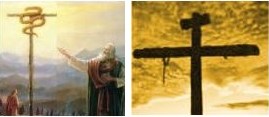
[ The following concerns this week's Torah reading, parashat Chukat... ]
07.05.22 (Tammuz 6, 5782) Where it says, "All Scripture is breathed out by God and profitable for teaching, for reproof, for correction, and for training in righteousness" (2 Tim. 3:16), we note that the Scriptures referred to are the words of Torah, since the New Testament had not yet been compiled when Paul had written these words. Paul further said: "These things (i.e., the stories recounted in the Torah) happened to them as examples for us. They were written down to warn us who live at the end of the age" (1 Cor. 10:11). "The deeds of the fathers are signs for the children," meaning that the narratives of the Bible serve as parables or allegories for us.
From our Torah portion this week (i.e., Chukat) we read how the people became discouraged along the way and complained against God and Moses, saying: "Why have you brought us up out of Egypt to die in the desert? For there is no food and no water, and our soul loathes this worthless bread (i.e., לֶּחֶם הַקְּלֹקֵל, lit. "cursed bread," referring to the manna). So the LORD sent venomous serpents (i.e., ha'nechashim ha'seraphim: הַנְּחָשִׁים הַשְּׂרָפִים, i.e., bronze colored snakes that gave a burning bite) among the people, and they bit the people and many of the people of Israel died. Then the people came to Moses and said, "We have sinned, for we have spoken against the LORD and against you. Pray to the LORD that He take away the serpent (הַנָּחָשׁ) from us." So Moses prayed for the people and the LORD then said to him, "Make a fiery serpent (שָׂרָף), and set it on a pole (נֵס); and it shall be that everyone who is bitten, and who looks upon it (i.e., the serpent), shall live" (Num. 21:4-8).
The "fiery serpent" – the venomous sting of which brings death – is what must be looked upon, confronted, and confessed. We must look at that which kills us, and by seeing it, we can then see God's miracle (נֵּס) that delivers us... Therefore we look to the cross – the place where Yeshua clothed himself with our sickness and sin – to realize God's remedy for our eternal healing. As Yeshua explained to Nicodemus, "As Moses lifted up the serpent in the wilderness, so must the Son of Man be lifted up, that whoever believes in him may have eternal life" (John 3:14-15). Humanity as a whole has been "bitten by the snake" and needs to be delivered from its lethal venom. Just as the image made in the likeness of the destroying snake was lifted up for Israel's healing, so the One made in the likeness of sinful flesh (Rom. 8:3) was to be lifted up as the Healer of the world. In Yeshua the miraculous exchange takes place: "For our sake he made him to be sin who knew no sin, so that in him we might become the righteousness of God" (2 Cor. 5:21). Bless His holy name!
Hebrew Lesson
Numbers 21:8b reading (click):
The serpent on the pole is the image of the serpent on the Tree of Life in the garden that was tempting Eve. It is fascinating that it was the same image nailed to the stake that represents the death of Messiah for our sins...
Celebrating True Freedom...
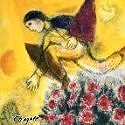
07.04.22 (Tammuz 5, 5782) Far from being "set free" by throwing off the "shackles" of the law, people are debased and brought into deeper darkness (Rom. 1:26-28; 2 Pet. 2:12). True freedom is not the power to do whatever you want but the power to choose what is right. "Right" and "wrong" are not subjective preferences but objective spiritual judgments indicated both by human conscience but more importantly though revelation of the Torah. Despite claims by foolish thinkers like Friedrich Nietzsche, moral truth is not malleable and subject to change. Just as human beings are subject to various physical laws to exist, so they are subject to moral laws. A person can no more murder another and escape the consequences than he can step off the ledge of a skyscraper and not fall to the earth.
Hebrew Lesson
Psalm 34:14 reading (click):
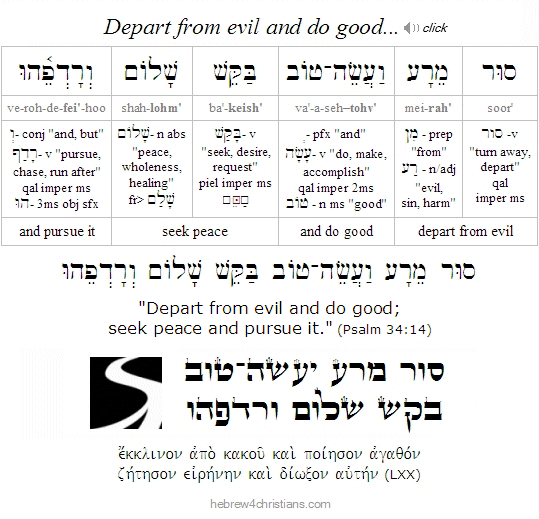 |
Alexis de Tocqueville once observed: "Democracy and socialism have nothing in common but one word: 'equality.' But notice the difference: while democracy seeks equality in liberty, socialism seeks equality in restraint and servitude."
The decree of Torah:
Parashat Chukat (חֻקַּת הַתּוֹרָה)...
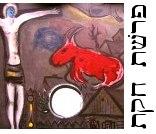
07.03.22 (Tammuz 4, 5782) Shalom chaverim! Our Torah portion this week (i.e., parashat Chukat) begins with the words: "zot chukat ha-Torah" (זאת חֻקַּת הַתּוֹרָה), "this is the decree of Torah" (Num. 19:2), referring to the sacrifice a specially chosen red cow (פרה אדומה) that would be used to cleanse the people from death. The language of the Torah here is both striking and unique, suggesting that this ritual is the "seminal decree" of the entire Torah...
The sages have said that this is a commandment that transcends human reason, and therefore we are to simply accept it by faith. If we think about the meaning of the mysterious decree of the red heifer, however, we will realize that its ashes were used to create the "waters of separation" (i.e., mei niddah: מֵי נִדָּה) to cleanse people from contact with death (i.e., separation). To fulfill God's vital decree, however, required sacrificial love, since the priest who offered this service would become defiled (separated) for the sake of healing of others.
The Hebrew word for love is ahavah (אַהֲבָה), from a root verb (יָהַב) that means "to give." Love means giving of yourself to benefit another person (John 15:13). The central decree of Torah, then, which is beyond our ability to rationally understand, is that God's love is so great that it is willing to become "dust and ashes" on our behalf so that we might find blessing and life.
Abraham Twerski comments: "The mitzvah of parah adamah (i.e., the red heifer) represents the suspension of logic in deference to the Divine Will. This attitude is not restricted to this mitzvah. Scripture introduces the mitzvah of the parah adamah with the words "this is the law of the Torah." Surrendering one's own reasoning and accepting the superior reasoning of Hashem is the law of the entire Torah... To the extent that we let go of our own will, we can understand the Divine will. Our ancestors at Sinai understood this ideal when they proclaimed, "we will do and then we will understand." Torah is not beyond our understanding, but we must be willing to make the sacrifices that true Torah understanding demands."
Yeshua willingly became unclean on our behalf - through contact with our sin and death - so that we could become clean (see Isa. 53:4, 2 Cor. 5:21, Gal. 3:3, Eph. 5:2, Titus 2:14). The pure became impure through His sacrificial offering. Because of Him, we have been cleansed from our sins (and the separation of death) "by a better sprinkling" than that which the Tabernacle of Moses could afford (Matt. 26:28, Heb. 9:14, 12:24, Eph. 1:7, 1 Pet. 1:2,18-19, Rom. 5:9; Col. 1:14, 1 John 1:7, etc.).
Shavuah Tov Audio Broadcasts
In the "Shavuah Tov" audio broadcast for this week I discuss the content of the Torah portion (i.e., Chukat), and particularly consider: 1) the significance of the mysterious Red Heifer (פרה אדומה) sacrifice, 2) the gospel message of the nachash nachoshet (the "bronze serpent"), and 3) the sin of Moses... In the first podcast I go into some discussion regarding the meaning of the mitzvot (commandments) of the written Torah, including the subcategories of chukkim (decrees), mishpatim (rules or judgments), eidot (testimonials, holidays) with a discussion of the oral tradition's corresponding categories of halakhah (oral law) and its subcategories of gezeirot ("fences"), takkanot (case laws), and minhagim (customs). Throughout special attention is given to how Yeshua the Messiah is the Substance and Inner Meaning of all true Torah. It is best to listen to these broadcasts in order:
In connection with our Torah reading for this week, note that the Hebrew word "chok" (חוֹק) means a "divine decree," related to a verb meaning "to engrave" (חָקַק). The sages say that the word is directed to a desire to do God's will that is "engraved" upon the heart rather than simply understood with the intellect (2 Cor. 3:3). Indeed the very first time "chok" (חוֹק) appears in the Torah concerns Abraham's obedience of faith as demonstrated by the sacrifice of his beloved son (Gen. 26:5), and the second time concerns the sacrifice of the Passover Lamb of God: "This day shall be for you a memorial day, and you shall keep it as a feast to the LORD; throughout your generations, as an eternal decree (חֻקַּת עוֹלָם), you shall keep it as a feast (Exod. 12:12-13). Because both the Akedah and the sacrifice of the Passover lamb reveal God's yeshuah, his salvation, we are to engrave the significance of our deliverance by the Lamb of God within our hearts forever... Amen, just as God Himself has so engraved us upon his own heart, it is written, "behold, I have engraved you on the palms of my hands" (הֵן עַל־כַּפַּיִם חַקּתִיךְ; Isa. 49:16). Shavuah Tov chaverim!
 |
The Father of Lights...
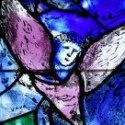
07.01.22 (Tammuz 2, 5782) It is written in our Scriptures: "God is light and in him is no darkness at all" (1 John 1:5). Our Savior is "the Light of the world," the overarching Reality that gives light to every soul who is born (John 1:9). As the Source of all light, his power is irrepressible, invincible, and overcomes every shade of darkness. Yeshua is the Logos (Λόγος), the underlying "logic" of all of creation. Unlike the transient radiance of the heavenly bodies, the Divine Light remains constant and supreme over all of creation, without any diminution or variation: God is the "Father of Lights" (James 1:17). And just as we know that the sun still shines even on the most overcast of days, so we understand that the Divine Presence is always there -- always giving, always shining, always loving us... We can trust in the power of our God to help us, since His radiance and truth pervade the darkness to enlighten our way (Psalm 112:4). As Yeshua said of his mission, "I have come into the world as light, so that whoever believes in me may not remain in darkness" (John 12:46). O precious LORD our God, let your light shine upon us...
אֱלהִים יְחָנֵּנוּ וִיבָרְכֵנוּ
יָאֵר פָּנָיו אִתָּנוּ סֶלָה
e·lo·heem · ye·chon·nei'·noo · vee·va·re·khei'·noo
ya·eir · pa·nav · ee·ta'·noo · se'·lah

"May God be gracious to us and bless us;
may he cause his face to shine upon us, selah."
(Psalm 67:1)

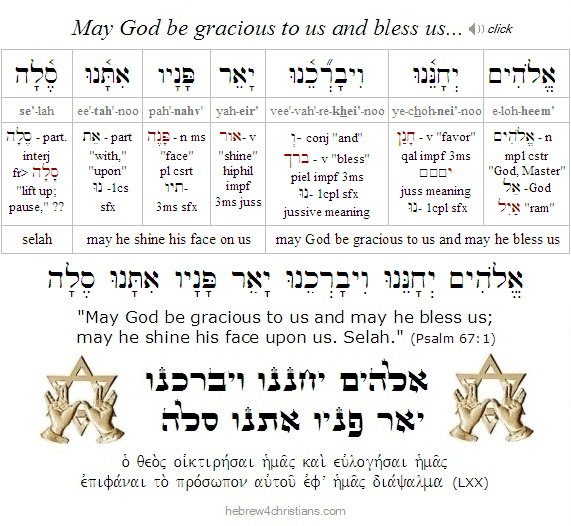
God's blessing flows, but we must allow the light of God's love to shine in us brightly. As Yeshua our Savior said, "Whoever has my commandments and keeps them, such is the one who loves me. And the one who loves me will be loved by my Father, and I will love him and will manifest myself to him" (John 14:21). Note that the Greek word for "manifest" means to "shine inside" (i.e., ἐμφανίζω, from ἐν, "in" and φαίνω, "shine"), indicating that the revelation would be the inward light of the Divine Presence. Indeed, the Hebrew word for "praise" (i.e., tehillah: תְּהִלָּה) comes from a verb that means "to shine" (i.e., halal: הָלַל), from which the word "halo" is derived. Similarly, the word "aura" comes from the Hebrew word "ohr" (אוֹר), meaning "light." Let your inner light shine before others so that they may see your good works and give honor to your Father who is in heaven" (Matt. 5:16).
Shabbat shalom chaverim. And thank you for praying for this ministry.... - John
The Message of Jude...
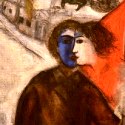
[ The following is related to this week's Torah reading, parashat Korach.... ]
07.01.22 (Tammuz 2, 5782) Our Torah portion this week (i.e., Korach) centers on the rebellion of Korah, a man who questioned God's authority and arrogantly sought to "intrude" into the office of the priesthood. It is noteworthy that his rebellion is explicitly mentioned only once in the New Testament - in the Book of Jude - as an example of the fate that awaits those false teachers who likewise despise God's moral law. Unfortunately, Jude's warning is often neglected today, probably because people feel uncomfortable over the prospect of God's judgment. After all, in our "politically correct" age, people have been indoctrinated to regard "tolerance" as the greatest of virtues and "intolerance" (especially of moral evil) as the greatest of vices.... Most unbelievers don't mind hearing the "good news" of God's love, but they take exception when they are confronted with their personal duty to live according to the moral truth revealed in the Torah. Everyone wants to go to heaven though they don't want to find a Holy LORD when they get there... False teachers within the church are dangerous because they feed on this sense of discomfort and attempt to rationalize or compromise it away. Jude identifies them as spiritual impostors who "work from the inside" to confound or obscure the truth of God. Such a charlatan may appear to be a genuine believer, but their hidden agenda is to sow confusion and sin among God's children. They are proverbial "wolves in sheep's clothing" (Matt. 7:15). Jude's warning is especially important for us to heed in this present hour, because in the time immediately preceding the coming of the Messiah, spiritual deception and unbridled godlessness will greatly increase (2 Tim. 3:1-5).
It is important to see that the primary characteristic of a false teacher is that they "deny our only Master and LORD, Yeshua the Messiah" -- that is, they deny His moral authority and identity as the LORD God (Jude 1:4). Since Jude is writing to those who are "beloved by God," that is, to sincere Jewish believers, he is careful to remind us that it was Yeshua Himself who saved the people from Egypt -- but afterward destroyed those who did not believe (Jude 1:5). In other words, Jude wanted to ensure that we fully understand that it was Yeshua who was the thunderous "Voice of the Living God speaking from the midst of the fire" at Sinai (Deut. 5:26), and therefore to regard Him as none other than the great Lawgiver Himself (Matt. 5:17-7:29). That is why he is called "our only Master and LORD," and to esteem him as anything less is to deny the reality and truth of God.
Many churches today teach that we can (and should) disregard the moral law of God. They may give lip service to the "old testament," and they may claim it is still of historical interest that provides some interesting stories, but they arrogantly discount its essential message of holiness as being inapplicable to our daily lives. Often they are antinomian, teaching that we are no longer "under the law" and therefore are free to live in sin. Because they disregard (or "reinterpret") the clear moral teaching of the Torah (and the New Testament), they wink at fornication, support alternative "marriages," endorse gay clergy, and clamor for abortion rights. Many of the institutionalized churches promote syncretistic "replacement theology" that invent rituals, holidays, and symbols that are alien to the truth revealed in the Jewish Scriptures. These churches are often tolerant of "universalism," new age mysticism, and regard postmodern skepticism as "trendy." They may claim they are "seeker sensitive" but this is often "code" that they disregard the moral duty believers have to walk in personal righteousness. And because of their willful ignorance, some of these churches unthinkingly accept anti-Jewish propaganda - despite the irrevocable promises God has made to the Jewish people. Jude likens advocates of such doctrines to be "inhabitants of Sodom and Gomorrah" who will likewise be judged by God with eternal fire...
In this connection let me remind you of a verse from the New Testament: "Let no one in any way deceive you, for it [Yeshua's return] will not come until the apostasy (ἀποστασία) comes...." (2 Thess. 2:3). The word "apostasy" literally means "standing away" (ἀπό + ἵστημι) from the truth while making a pretense of abiding within it. In Hebrew, the word is meshuvah (מְשׁוּבָה), one who "turns away" from God. It is not a word that describes an unbeliever as much as it describes a traitor.... Some people think there will be a great time of revival just before Yeshua returns, but unfortunately that is not true. Indeed, Yeshua asked if he would find anyone who had faith at that time (Luke 18:8). At any rate, Jude states that those who "creep into" congregations to teach truth contrary to the revealed will of God are apostates, and the judgment they face is terrible to consider.
We can guard against false teachers by using discernment to "test their spirits" (1 John 4:1), but we can only be equipped to do so if we "build ourselves up in the most holy faith" (Jude 1:20). We build ourselves up by carefully studying the word of God - especially the Torah, since it is the foundation of all that follows. In this way we will be able to accurately wield the Sword of the Spirit (2 Tim. 2:15-16, 2 Pet. 1:19-20). In order to grow, we must have "good soil" for the seed of the word to take root. We "get rooted by knowing the roots" of our faith! Studying the Scriptures and praying in the Holy Spirit keeps us in the love of God as we wait for the mercy of Yeshua who gives us eternal life (Jude 1:21). This will equip us to show mercy to those who have honest doubts and to save those who are defiled by sin (Jude 1:22-23).
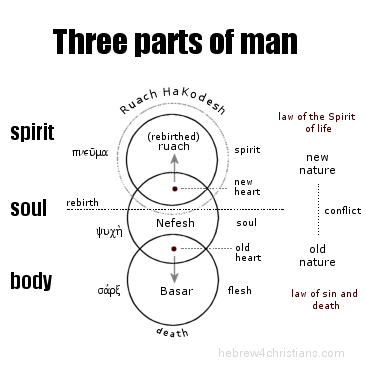 |
For more on this subject, please see:
The Gift of the Sabbath...
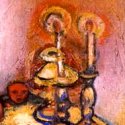
07.01.22 (Tammuz 2, 5782) "Remember the Sabbath day to keep it sacred" (Exod. 20:8). The Sabbath is a gift from God, a day of "double portion" of manna, and a time to let go of our daily concerns and surrender to God's care for us.... If the Almighty, blessed be He, rested on the seventh day, how much more should we rest and find comfort from our weariness? Yeshua, who is "the Lord of the Sabbath" (אדון השׁבת) invites you to enter into his secret place and find strength: "Come to me, all who labor and are heavy laden, and I will give you rest. Take my yoke on you and learn from me, because I am gentle and humble in heart, and you will find rest for your souls" (Matt. 11:28-29). Yeshua stands at the door and knocks. Repeat this inwardly until it comes to life within your heart: "Come unto me, and I will give you rest... learn from me and I will give you my peace."
Sabbath is a set apart time to reconnect with what really matters... and therefore it is a form of worship. "Sabbath peace" (שלום שבת) is wholeness, healing, and a pleasure - a step out of the profane world into the sacred. We enjoy the Sabbath - we call it a "delight" (ענג) - by choosing to make a place for the holy in our lives (see Isa. 58:13). We reflect on the gift of Torah, the blessing of Messiah, and engage in life-giving activities (Mark 2:27). We avoid bringing up topics that sadden or "draw tears" - we flee from fret, regret, and anger...
The Sabbath teaches us the blessedness of "being" apart from "doing"; it reconnects us with the inherent sanctity of life itself... It was after God created the world and all that was in it that he sanctified time (Gen. 2:3). God himself "created the world to do" (ברא אלהים לעשׂות) but made time to celebrate his work. The Sabbath gives us a transcendental perspective - seeing time as a blessing in and of itself - apart from the "doing" of things in our lives.
Ultimately Sabbath is a matter of the heart - resting in the work of God given on our behalf - both by honoring the blessing of our existence itself and also our deliverance from slavery to sin (Exod. 20:11; Deut. 5:15). Knowing who we are is the crux of the matter. The particular "rules" of the Sabbath day, however, for instance, what we can or can't do, must serve that greater end: "the Sabbath was made for man, and not man for the Sabbath" (Mark 2:27). That was the great error of the Pharisees of Yeshua's day -- "fencing off" the Sabbath make it a prison rather than a palace. No, we celebrate the Sabbath and call it a delight; we reconnect with our inner heart and seek deeper communion with God. Because of Yeshua, "there remains a Sabbath rest for the people of God" (Heb. 4:9). Amen, and Shabbat Shalom!
Hebrew Lesson
Exodus 20:8 reading and commentary (click):
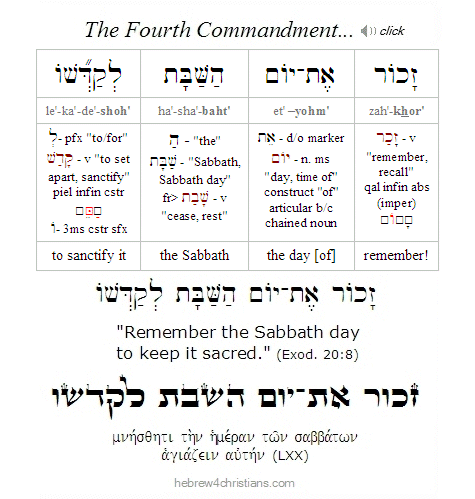 |
Note: Some people worry about what day should be set apart as the Sabbath. Of course every day is a "Sabbath" for those trusting in Yeshua, and we have a certain liberty under the guidance of the LORD of the Sabbath as well as the counsel of the Apostle Paul (Rom. 14:5-8). Moreover, Yeshua told those who criticized him for "working" on the Sabbath that the Torah justified the work of the priests in their service: "have you not read in the Law how on the Sabbath the priests in the temple profane the Sabbath and are guiltless?" (Matt. 12:5). As priests of the new covenant given in Messiah (Rev. 1:6; 1 Pet. 2:5, 2:9; Deut. 7:6) we also can work on the Sabbath if it is necessary for the preservation of life or for promoting healing and blessing to others. The important point is to understand that the Sabbath is a God-given invitation to set apart some time each week (or each day!) to reconnect with what is real...
A special word of thanks to all friends of Hebrew for Christians. We pray for you regularly and are grateful to the Lord for your connection with us. Shalom and love and good and blessing and peace and healing and life and joy be yours always in our beloved Messiah!
 |
The Judgment of Korah...
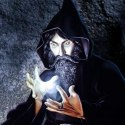
[ The following entry concerns this week's Torah reading, parashat Korach... ]
07.01.22 (Tammuz 2, 5782) "And the earth opened its mouth and swallowed Korach up..." The dreadful example Korah is a warning for us not to transgress what God has ordained lest we likewise incur severe judgment... In this connection let me remind you that the terms of the New Covenant (בְּרִית חֲדָשָׁה) are non-negotiable, and those who attempt to come to God apart from the cross - that is, apart from the shed blood of Messiah for atonement - likewise encroach upon the Divine Presence. Indeed, in the Book of Galatians, Paul invoked a divine curse on anyone who denied that the work of Yeshua is entirely sufficient for the trusting sinner to be justified and declared righteous by God (Gal. 1:8-9). Those who therefore claim that "something more" is needed than the finished work of Messiah (e.g., circumcision, law-keeping, religious observances, mystical experiences, etc.) remain under the curse (חֵרֶם) demanded by the law (Gal. 3:10; John 3:36). This is not a mere difference of opinion regarding how people are "justified" before God, since Paul goes on to make the case that those who teach otherwise are not truly saved -- even if they should profess that Yeshua is the true Messiah and Savior of Israel! Therefore Messianic teachers who falsely claim that Christians must "follow the law" to be made right with God are liable to the curse of the law. These people are not simply misinformed; according to Paul and the witness of the Holy Spirit, they are actually lost souls. "Beware of the leaven of the Pharisees," chaverim...
It's been wisely said that we must "unlearn" a lot during the days of our sojourn in this world, and that is especially true for people who still assume that they know something about life. "If anyone imagines that he knows something, he does not yet know as he needs to know" (1 Cor. 8:2). And it is also true, I'm afraid, for religious people, that is, for those who regard spirituality as a litany of "do's and don'ts" or a recipe of rituals rather than as receiving the miracle of new life given to us by the miracle of God.
"Anyone who has set aside the law of Moses (תּוֹרַת משֶׁה) dies without mercy on the evidence of two or three witnesses. How much worse punishment, do you think, will be deserved by the one who has trampled underfoot the Son of God, and has profaned the blood of the covenant (דַּם הַבְּרִית) by which he was sanctified, and has outraged the Spirit of grace?" - Heb. 10:28-29
Life Worth Living...

07.01.22 (Tammuz 2, 5782) It is common to encounter people today who refuse to believe that God exists, not because there are compelling reasons to do so, but simply because they do not want God to exist, and therefore they willfully suppress the intuitions of logic, the apprehension of value, the awareness of glory in creation, and the sentiments of conscience, since all these experiences point to the realm of moral and spiritual reality. As it is stated in our Scriptures: "For that which may be known of God is manifest in them; for God has revealed it to them. For the invisible attributes of him from the creation of the world are clearly seen, being understood by the things that are made, even his eternal power and divinity; so that they are without excuse" (Rom. 1:19-20). Indeed, atheists and agnostics dogmatically affirm that there is no transcendental "moral law" or Moral Lawgiver before whom all moral agents will give account, again, not because reason indicates that this is so, but on the contrary, merely because they wish to be "free" to do whatever they want and to pursue their own selfish desires. In this regard the atheist merely chooses to close his mind because he does not want to see (for an example of this type of madness, read Frederick Nietzsche). As Rabbi Israel ben Eliezer (בש"ט) once said, "The world is full of wonders and miracles but man takes his little hand and covers his eyes and sees nothing." Indeed the deification of the self makes the soul a stranger to God and blind to moral and spiritual reality. The modern man will split hairs and fastidiously object to questions of truth and meaning -- all for the sake of living life as he pleases, on his own terms, without recognizing any moral authority beyond himself....
Everyone has a faith system by which they interpret and make sense of what they believe (or trust) is real... Socrates famously said that "the unexamined life is not worth living," which of course implies that a life worth living is discovered by asking questions, searching for meaning, pursuing truth, celebrating wonder, and living with integrity. "Seek the LORD while He may be found" (Isa. 55:6). Contrary to the ideals of worldly culture, the meaning of life is not found in the pursuit of personal happiness (or pleasure) but rather in the pursuit of truth and meaning. Apathy about such matters is a symptom of lifelessness: it is to be spiritually dead while seemingly "alive." Indifferent people are likened to those who go through the outward motions of life without ever making inner traction with it... The righteous, even in death, are called "living"; the wicked, even while alive, are called "dead" (Berachot 18a).
"Truth is so obscure in these times, and falsehood so established, that, unless
we love the truth, we cannot know it." - Blaise Pascal
A radical "metaphysical" question is "Why is there something rather than nothing at all?" Such a fundamental question strikes at the heart of our assumptions and habitual ways of thinking, jolting us from our sleepy "cave-like" consciousness to face the glaring light of the sun... The natural instinct is to turn away, to pull the covers over our head, and try to go back to sleep. However if pressed, the simple question "why" irresistibly leads to a series or "concatenation" of explanations and a regress of ostensible causes that quickly points to metaphysical properties and realities. For instance, if a child asks her parent, "Why do people die?" the parent might answer, "Because people get sick or injured or they might grow very old." "But why do people have to grow old?" the child continues. "Because they are born, live for awhile, and eventually pass away... All things change, and that means they come into being, exist for a while, and then pass away. Look around you; everything you see – the people, the animals, the plants, rocks, mountains and seas, the earth and sky, the stars and galaxies, and indeed the whole universe – is constantly changing, coming into being, existing for awhile, and then passing away..." "But why does everything have to pass away?" the child persists... In this imaginary dialog we see how quickly "why questions" begin pointing to deep metaphysical mysteries such as the nature of being, the phenomenon of time, the ubiquity of change and its existential relationship to human consciousness. The dialectic of asking and answering questions helps us detect the assumptions that underlie our everyday thinking, often revealing wonders that pervade our lives. The failure to seriously ask the "big questions" of life, for instance, "What am I?" "Where did I come from?" "Why am I here?" "Where am I going?" and "What does it all mean?" is to abandon what makes life itself worth living... It is to give up the quest to find meaning, purpose, hope, and a sense of destiny. It is to die inside.
Everyone has a faith system by which they exercise trust is in what is real... The existential question, then, is not whether someone has faith, but what they are trusting about the ultimate concerns, questions of life and death, and so on...
Hebrew Lesson
Isaiah 6:3 reading (click):
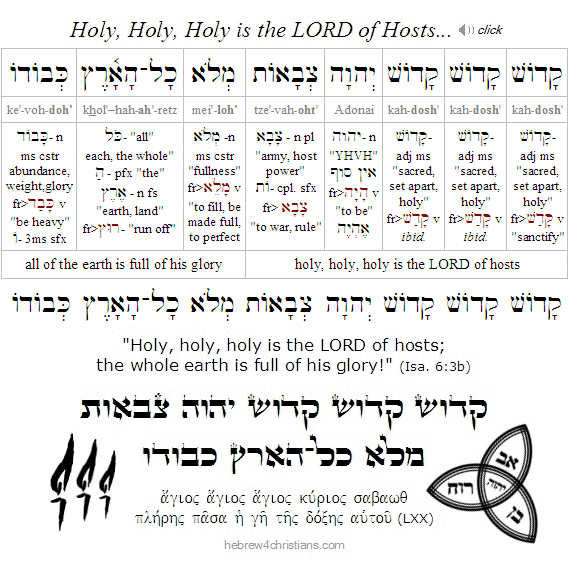 |
<< Return
|
|













